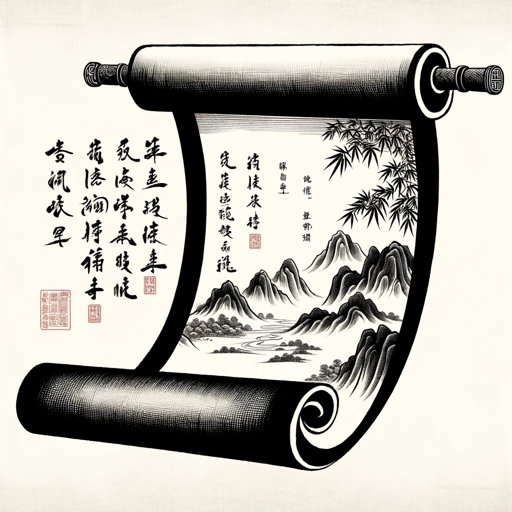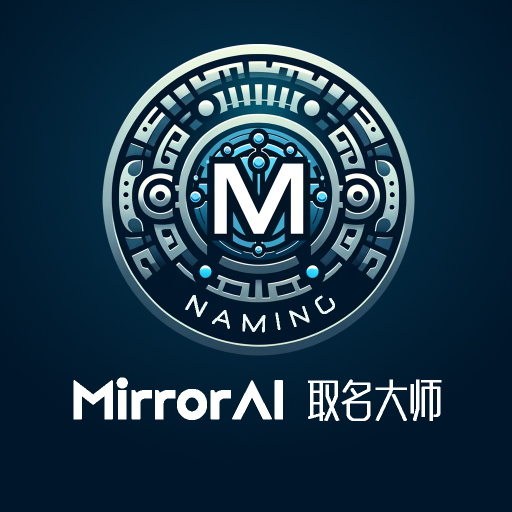Chinese Name Generator-Chinese name generator for English names
AI-powered Chinese Name Generator for Unique, Classical Names
Suggest a Chinese name for James Smith
Find a Chinese name close to Emma Johnson
I need a Chinese name for William Brown
Create a Chinese name for Sophia Miller
Related Tools
Load More
Name Generator
Creative name generator for startups, apps, websites, and logos.

起名助手
基于《诗经》、《唐诗三百首》的中文人名起名助手。

AI 起名大全
周易生辰八字取名,在线起名结合生肖生辰八字-国学周易-五行喜忌-唐诗宋词-诗经楚辞-三才五格,起专属自己的好寓意美名,郎朗上口不重名!已为1000万+用户赋予专属好名!

MirrorAI取名大师
目前部分功能在完善中,完善后会在首页告诉大家。根据姓名五格,五行干支,基于你的生日,定制化你的姓名,助你大吉大利好运连连!支持正式姓名,笔名艺名等昵称,支持名字中出现指定的字,更多功能等你探索。

Pickname(取英文名)
全球第一款专为中国人设计取名的GPTs 助手

Baby Name Generator
A friendly baby name generator with cultural knowledge.
20.0 / 5 (200 votes)
Introduction to the Chinese Name Generator
The Chinese Name Generator is designed to help non-Chinese speakers find unique and meaningful Chinese names, drawing inspiration from Chinese classics such as 大学 (The Great Learning), 诗经 (The Book of Songs), 论语 (The Analects of Confucius), and 中庸 (The Doctrine of the Mean). Unlike simple transliterations based on sound, the generator blends phonetic similarity with deep cultural significance. Its core function is to suggest Chinese names that resonate both phonetically and thematically with the original English names. For example, if an English user has the name 'Grace', the generator might return a name like '雅慧' (Ya Hui), which means 'elegant wisdom,' with reference to the Book of Songs. This approach ensures that the names not only sound appropriate but also carry profound meaning from Chinese philosophy, history, and poetry.

Main Functions of the Chinese Name Generator
Family Name Generation
Example
For an English last name like 'Smith', the generator might choose '施' (Shi), which has a similar sound and is a common Chinese surname.
Scenario
A user with the last name 'Brown' is looking for a Chinese family name for official documents in China. The generator offers a culturally appropriate surname such as '包' (Bao) that aligns phonetically.
Given Name Generation with Cultural Reference
Example
For the given name 'Lily', the generator could suggest '丽芳' (Li Fang), where '丽' means 'beautiful' and '芳' means 'fragrance'. The name draws on classical imagery from the Book of Songs, where flowers symbolize beauty and virtue.
Scenario
An individual named 'Jason' wants a Chinese name for a business setting. The generator suggests '杰森' (Jie Sen), which means 'heroic and forest', referencing the classic idea of strength and nature found in the Book of Songs.
Names Based on Classical Texts
Example
For the name 'Sophia', the generator could return '智雅' (Zhi Ya), referencing a passage in 论语 (The Analects) that speaks of the value of wisdom (智) and refinement (雅).
Scenario
A philosophy student named 'Sophia' wishes to adopt a Chinese name that reflects her interest in Confucianism. The generator selects a name based on classic teachings from Confucius that emphasize wisdom and virtue.
Ideal Users of the Chinese Name Generator
Individuals seeking culturally appropriate Chinese names
Non-Chinese speakers who want to adopt a Chinese name for professional, academic, or personal purposes will benefit from using this service. This includes expatriates living in China, business professionals, students, and those seeking names for legal documents.
People interested in Chinese culture and classics
Those with a deep appreciation for Chinese philosophy, literature, and poetry can use the service to find names that are rich in meaning and historical significance. It allows users to connect their identity to profound cultural elements.

How to Use the Chinese Name Generator
1
Visit aichatonline.org for a free trial without login, also no need for ChatGPT Plus.
2
Input your English name in the provided fields, specifying both your family name and given name.
3
The tool will analyze your name, matching the family name to a single-character Chinese surname with phonetic similarity.
4
For the given name, the generator considers classical Chinese texts like the *Shijing* or *Analects* to suggest a meaningful name based on phonetic resemblance and cultural significance.
5
Review the suggested name along with the explanation, which includes the meaning of the name and the classical reference.
Try other advanced and practical GPTs
Extensive internet search
AI-Powered Comprehensive Search

BullAware (eToro GPT)
AI-Powered Insights for Smarter Investing
Midjourney提示词大师
Transform your ideas with AI-powered prompts.

French Tutor
Master French with AI-Powered Precision

React Copilot
AI-powered assistant for React developers

Client Reporting Automator GPT
Automate reports effortlessly with AI.

Sage
AI-powered tool for detailed insights.

Negotiation GPT
AI-powered negotiation strategies for success

eduGPT
AI-Powered Educational Resource Creation

The 4pillars of destiny: 四柱推命の占い師
AI-powered Four Pillars of Destiny tool.

Evolving Mind
AI-powered exploration of existence and consciousness.

AppSec Advisor
AI-powered security assessments made simple.

- Creative Writing
- Character Development
- Personal Identity
- Cultural Naming
- Cross-Cultural Engagement
Frequently Asked Questions about the Chinese Name Generator
Can I use the Chinese Name Generator without knowing Chinese?
Yes, the tool is designed for non-Chinese speakers. It generates names based on your English name, offering explanations in English for the meaning and classical references behind each name.
How does the generator choose a family name for me?
The generator matches your English surname to a single-character Chinese surname that has a similar phonetic structure. It prioritizes popular and culturally significant Chinese surnames.
What role do Chinese classics play in name generation?
The given names are inspired by classical Chinese texts like the *Shijing*, *Analects*, and *Daxue*. The tool selects names that are both meaningful and culturally resonant, ensuring a connection to these ancient works.
How accurate is the phonetic match between English and Chinese names?
While the phonetic match may not be exact, the tool tries to balance sound similarity with cultural significance, providing names that are aesthetically pleasing and meaningful.
Can I use the generated Chinese name for official purposes?
Though the generated name is culturally meaningful, you should consult with legal authorities before using it in official documents. It's best suited for personal or creative use.